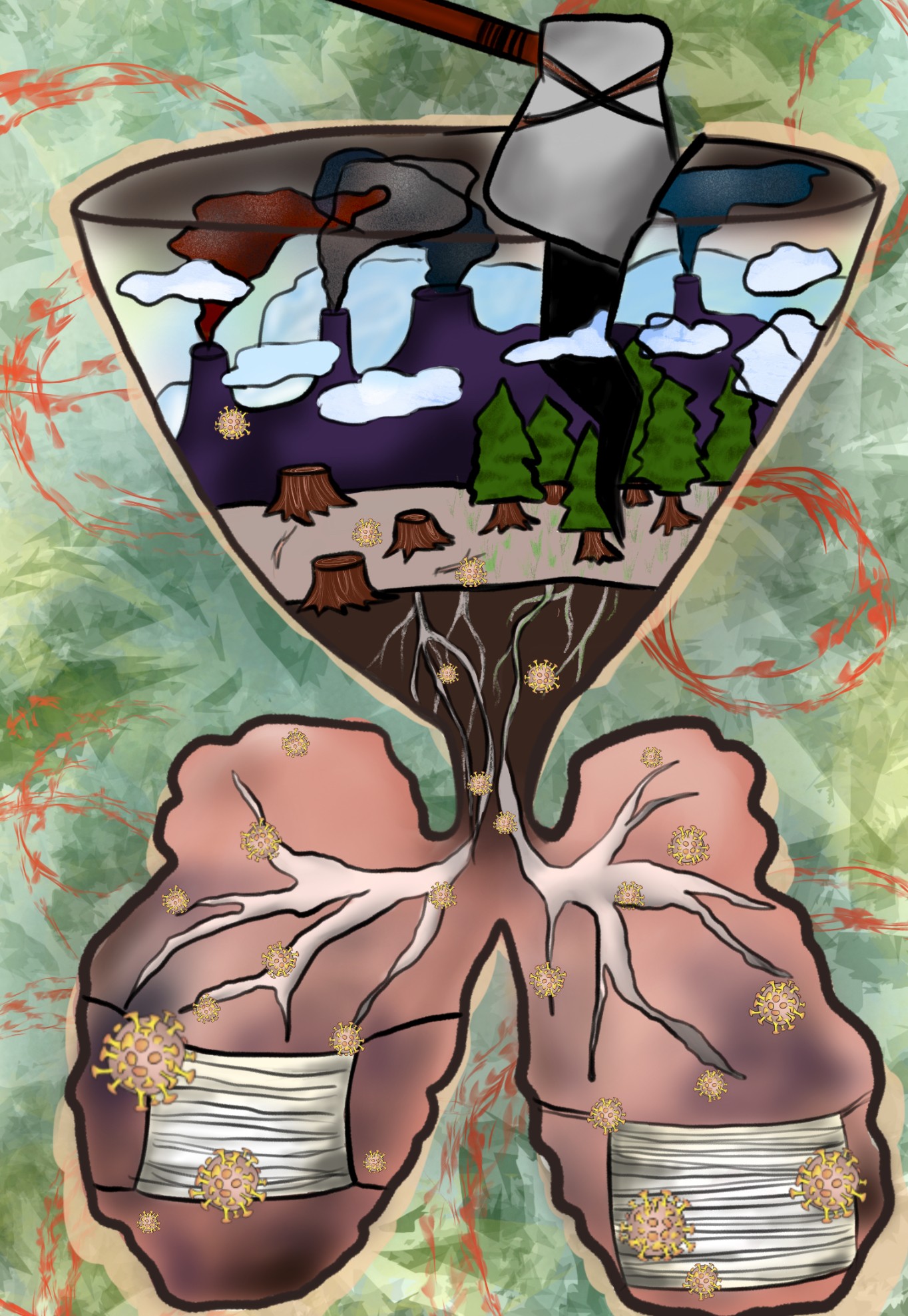Campus Queries: What environmental factors are linked to the coronavirus pandemic?

(Catherine Xie/Daily Bruin)

By Lauren Man
June 4, 2020 12:59 p.m.
Campus Queries is a series in which Daily Bruin readers and staff present science-related questions for UCLA professors and experts to answer.
Q: Is there a link between environmental issues and the COVID-19 pandemic?
A: Habitat destruction, wildlife markets and climate change may be linked to zoonotic spillovers like the one that’s caused the COVID-19 pandemic, whereas the link between biodiversity loss and the pandemic is less clear.
SARS-CoV-2, which causes COVID-19, is a zoonotic virus that likely came from horseshoe bats in China, said Amandine Gamble, a postdoctoral researcher in the Lloyd-Smith Laboratory at UCLA.
Zoonotic viruses spread from exclusive animal hosts to humans in a zoonotic spillover event, said Thomas Smith, an ecology and evolutionary biology professor at UCLA.
Zoonotic disease outbreaks are a result of increased contact between humans and wild animals due to processes like deforestation and habitat destruction, Gamble said. For example, if fruit trees in the forest disappear because of deforestation, bats are more likely to go into people’s gardens to feed on cultivated fruit trees, creating opportunities for more zoonotic spillovers between wild animals and humans, she said.
A 2007 study by University of Hong Kong researchers warned that horseshoe bats naturally house viruses similar to SARS-CoV and the practice of eating wild animals in southern China was a “time bomb” for the reemergence of another SARS-like virus.
This study was published after the 2003 SARS epidemic in Hong Kong. Thirteen years later, the COVID-19 outbreak happened.
It is unclear how SARS-CoV-2 started infecting humans, but researchers think an intermediate host enabled the transmission from bats to humans, Gamble said.
A popular theory for the SARS-CoV-2 intermediary is pangolins, which are common in China’s wildlife markets, but there is little evidence to support this theory, Gamble said. The virus detected from the pangolin was closely related, but not the same as the one responsible for the pandemic, she said.
These types of spillover events are not exclusive to coronaviruses. Henipaviruses, another type of virus found in fruit bats, are transmitted directly from bats to humans in Bangladesh through the palm sap they drink, Gamble said. In Malaysia, henipaviruses are transmitted from bats to pigs in pig farms while the bats eat fruits there, and people get infected by the pigs, she added.
Wildlife markets are also a hotbed for transmission, since wild animals from all around the world are put in small cages in close proximity to each other, Smith said. Animals defecate on each other and are often slaughtered next to each other, creating optimal conditions for the transfer of the virus from one animal to another, he said.
The link between biodiversity loss and zoonotic spillovers is less clear. Biodiversity loss can broadly be defined as the decrease in the number and variety of species. The Earth is currently undergoing its sixth mass extinction event, caused by human factors, according to a study supported by the National Autonomous University of Mexico and Stanford University.
It remains unclear whether the extinction event and zoonotic spillovers are correlated.
“We don’t know if having more species actually creates a better environment for the virus to replicate and evolve. … So you could think that having more biodiversity will result in more zoonotic spillover events,” Gamble said. “But there’s also what we call a ‘dilution effect’ – the more species you have available for parasites, the less likely it will end up in humans.”
However, zoonotic spillovers are ultimately hard to detect, making it difficult to quantify the correlation between biodiversity and spillovers, she added.
When speaking about biodiversity loss and habitat destruction, it doesn’t take long for climate change to enter the conversation, Smith said. As the planet warms, both humans and animals move to cooler places, he said.
“It means there’s going to be a lot more mixing – animals going to places where they haven’t been before, and humans as well,” Smith said. “From a pandemic standpoint, I think there’s the potential to see much more spillover of these sorts of diseases. That’s sort of the hook between climate change and pandemics.”
There have been reports of improved air quality as a result of decreased human activity during the pandemic. However, when carbon emissions dropped sharply after recessions in the past, they rebounded and negated any short-term decrease in emissions, according to an article by BBC Future. To achieve any long-term effect, there needs to be large changes, such as a move toward clean energy, according to Glen Peters of the Center for International Climate and Environment Research in Oslo.
“I think as soon as there’s a vaccine discovered, people are going to go back to driving their cars and doing as much as they did before,” Smith said. “The hope is that this pandemic will be a wake-up call to people to think about how they’re changing the climate and the biodiversity that we all depend on.”


